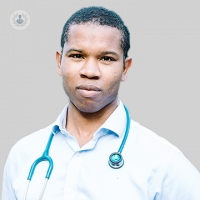What are the more complex causes of persistent cough in kids?
Written in association with:Children cough more than you would think. One study in the UK shows that normal healthy children will have an average of 11 separate episodes or bouts of coughing in a given 24-hour period. When cough occurs enough for you or your child’s school or daycare to notice it as being different from the norm then it may be worth thinking about why.
Following on from his first article published here on the more common causes of persistent cough in children, leading respiratory paediatricians Dr Chinedu Nwokoro delves into the more possible complex causes.
Most of the time it’s obvious and not concerning: your child has a cold or ear or throat infection, or perhaps a minor chest infection, they’ll have a snotty nose or mild fever, and all that’s needed is to ride it out with fluids and temperature control.
It gets better in a few days, sometimes with a milder and improving cough for up to four weeks later. This article touches on what to do and think if the cough doesn’t fit this pattern, or perhaps takes significantly longer than this to get better, at which point it can be termed a persistent cough.

What are the more complex conditions that might cause persistent cough in children?
The rarer causes of persistent cough in kids may be any of the following:
Immunodeficiency
This describes the situation where the immune system (by which our bodies fight infection) underperforms relative to the challenge it faces. In this situation, infections may take longer to clear and cause more damage to the lungs than would be normal.
Children with immune problems will often grow less well and may also have infections in other parts of the body including the skin and the gut. They may require longer courses of antibiotics, may need long-term antibiotic protection (known as prophylaxis) and may benefit from additional immunisation or airway physiotherapy.
Bronchiectasis
This is a condition with lung damage caused by repeated infection, resulting in dilatation of the breathing tubes and production of large amounts of phlegm (often swallowed) and persistent wet cough.
In extreme situations, it can be caused by many of the conditions described above if not treated, especially immunodeficiency, but is usually associated with inherited conditions such as cystic fibrosis (CF) or primary ciliary dyskinesia (PCD).
- CF is almost overwhelmingly diagnosed within a few weeks of birth though the UK newborn screening program. It is therefore extremely unlikely that your child’s persistent cough is due to CF. The symptoms of untreated CF include cough, poor weight gain, loose oily stools and salty skin, however, milder cases may not have all of these. Treatment is via specialist multidisciplinary teams and involves hydration, antibiotics, physiotherapy and nutritional support and increasingly, specialist genetically personalised drug treatments.
- PCD is more difficult to diagnose but key features are a runny nose since birth or shortly after birth, persistent ear infections, perhaps with continued discharge after grommet surgery, recurrent cough and chest infections, and (in a proportion of cases) reverse orientation of the heart (points to the right, not the left) and abdominal organs (situs inversus). Treatment is similar to that of CF although genetically determined treatments are not yet on the horizon.
Heart disease
Some babies with heart disease will have cough as a feature. They may have shortness of breath and sweating with feeding and will struggle to gain weight. Treatment is by specialist cardiology units and can involve medication and/or surgery.
Habit cough
I mention this here because it can be amongst the most difficult of all to diagnose. The child with a habit or ‘psychogenic’ cough will look well. They may cough far more during medical examination than at other times, in the presence of a worried parent, or on a school day.
They may be worse in times of psychological, school or social stress such as exams or major sporting matches, and will cough far less when asleep.
The cough is dry and may occur more prominently when talked about. It may get better rapidly with treatment (sometimes more rapidly than expected from the way the medicine works), or it may respond to no treatments at all.
It is difficult to diagnose and difficult to treat, and depends on calm, undemonstrative reassurance (bordering on dismissal) from both doctor and parent, with concomitant attention to any underlying stressors, sometimes with the assistance of a specialist children’s psychologist.
How can persistent cough be treated?
As intimated in the first paragraph most cough needs no specific treatment at all. At home a trial of patient reassurance combined with paracetamol, honey and lemon, and perhaps an over the counter remedy (evidence for this is weak) is usually all that’s needed.
If things persist for more than 4-8 weeks then treatment depends on the features present, and I have discussed the issues for consideration in the preceding paragraphs.
A persistent wet cough with no other features warrants a cough swab and a trial of a longer course of oral antibiotics in the first instance, with further investigations and treatments reserved for the circumstance where this does not work or where other features such as those described above point in more exotic directions.
This article is NOT a replacement for seeking medical advice for your child. Please visit your GP after which a paediatrician, or do come to see me at my clinic if you’re concerned about your child’s persistent cough. You can make an appointment via my Top Doctor's profile here.



